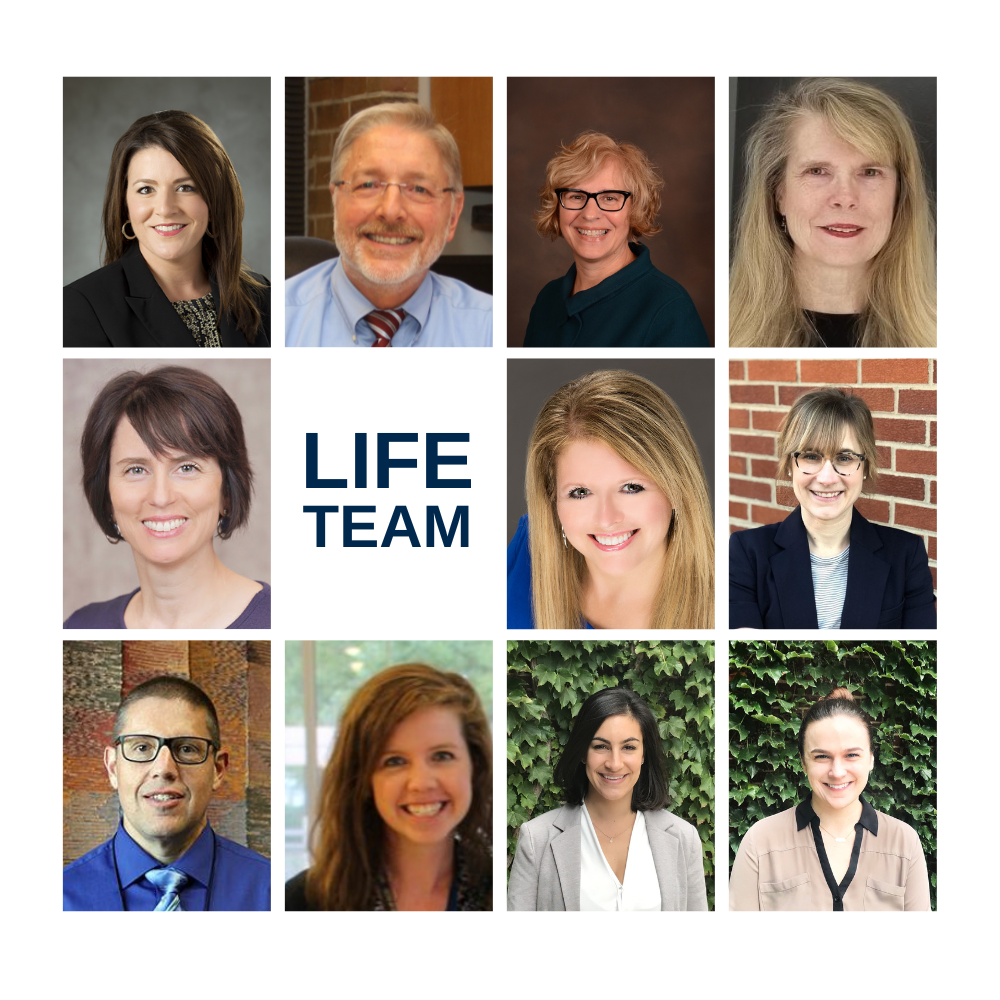LIFE: Longitudinal Interprofessional Family-Based Experience
LIFE Team

The COVID-19 Pandemic created the opportunity to shift from the normal practice of limited team interactions on case-based experiences and maximize innovative approaches to expand into experiential, longitudinal, authentic team work in collaboration with real patients and families. The result was the Longitudinal Interprofessional Family-based Experience (LIFE). In 2021, it’s pilot year, LIFE engaged 48 early learners from eight health science schools in virtual synchronous and asynchronous team skill-based interactions coupled with real patient experiential learning over 11 weeks. Interprofessional teams were introduced to and encouraged to apply the socio-ecological model (SEM) and social determinants of health (SDH) while collaboratively exploring the impact of the patient-family’s interface with the healthcare system and community during two virtual patient-family interviews.
Collaboration with Michigan Medicine’s Office of Patient Experience provided eight patients, all of whom had experienced chronic illness and treatment in the system, to engage with the learners as both teachers as well as evaluators in this experience. LIFE is a framework model that has applicability and adaptability for designing, implementing, and sustaining experiential IPE.
Students were put into interprofessional teams and assigned to a patient and two faculty facilitators for the semester-long activity. LIFE was managed in Canvas and largely self-driven by the students with both synchronous and asynchronous components. All communications and interactions occurred via Canvas and Zoom, eliminating the typical complexities of interdisciplinary learning and teaching related to time, space, location, and scheduling across curricula. The flexibility was a necessity for interprofessional students but was also appreciated by the patients.
“I loved the remote format and even in the future when things are back to “normal” I think It would still be beneficial to have these sessions via Zoom/video all. I think more patients will be willing to participate if they were out of town, unable to meet in person, feeling sick/flu like. These events can still happen anywhere virtually.” (patient quote)
Effective interprofessional practice requires execution of all IPE competencies: Interprofessional communication, teamwork, roles and responsibilities, values/ethics, and intercultural humility. While faculty were available and monitored student engagement and work, LIFE was intentionally designed to provide learning opportunities for students to perform as an interprofessional team, learn from one another, and be self-guided and accountable to one another. This design mirrored the collaborative practice that happens in real interprofessional teams. Ensuring students are socialized to practice in a manner that develops interprofessional collaboration as part of their professional identity is key to creating a critical mass of practitioners ready to engage in effective patient care.
Evaluation of patient and student feedback indicated mutually beneficial outcomes including student development of core IPE competencies and patients’ sense of meaning-making through participation in IPE. Evaluation tools indicated significant improvements in maintaining collaborative working relationships, integrating all professional roles, using team functioning strategies, and understanding of the roles and responsibilities of different health professions.
Inclusion of patient perspectives in the teaching and evaluation of student team performance is rarely if ever reported in the literature. Adding patient-family voices to IPE teaching and evaluation embodies and expresses an institutional value to staff, faculty, providers, patients and the community at large. Participating patients noted that it also impacted how they felt about health care of the future and their health care experience. “I know healthcare is in good hands!” (Patient) “I am really grateful for being able to participate in the LIFE program. It gave me insight into how interprofessional health care works for patients, and just how much integrating fields can help a patient dealing with chronic illnesses.” (Student)
“I loved the remote format and even in the future when things are back to “normal” I think It would still be beneficial to have these sessions via Zoom/video all. I think more patients will be willing to participate if they were out of town, unable to meet in person, feeling sick/flu like. These events can still happen anywhere virtually.”
This innovative design utilizes a previously untapped collaboration with existing health system and community partners to increase accessibility and sustainability of patient-inclusive IPE and lays the groundwork for greater patient involvement in and evaluation of IPE. The model was designed to be scalable in that it requires little effort from faculty facilitators and limited commitment from patient-family units. The program is managed entirely on CANVAS and utilizes Zoom to convene an interprofessional team and family meeting without the limitations of space and location. Because it is online, it also opens up the opportunity for students across various schools and campuses to engage with each other at a level which has not been previously done. As such, LIFE could potentially scale to beyond U-M, and could be an IPE experience across the BIG 10 or beyond. The faculty team already disseminated their work through the Journal of Pedagogy in Health Promotion (Mattison D, Smith LJ, Balzer K, Bavireddy V, Bishop TW, Farris K, Fitzgerald M, Rulli D, Trupiano N, Anderson, OS. Longitudinal Interprofessional Family-Based Experience (LIFE): An Authentic Experiential Interprofessional Education Learning Framework. Pedagogy in Health Promotion. Published online December 6, 2021. doi:10.1177/23733799211060726).
In addition to the opportunities of scaling LIFE, this model of team-based longitudinal learning can be applied to major societal issues beyond health and health care. This could be a model used for any big-problem solving effort requiring perspectives of several disciplines and the community.
Above photo:
- Laura J. Smith, PT, DPT, PhD,College of Health Sciences;
- Mark Fitzgerald, DDS, MS,School of Dentistry
- Karen B. Farris, BS Pharm, MPA, Ph.D.,College of Pharmacy
- Debra Mattison, MSW, LMSW, School of Social Work
- Danielle Rulli, RDH, MS, DHSc, School of Dentistry
- Peggy Ursuy, Ph.D., RN, PPCNP-B,School of Nursing
- Olivia S. Anderson, Ph.D., MPH, RD,School of Public Health
- Thomas Bishop, Psy.D, MA,School of Medicine
- Kate Balzer, LMSW, Office of Patient Experience
- Vani Patterson, MPH, Center for IPE
- Lindsay Telega, Center for IPE
